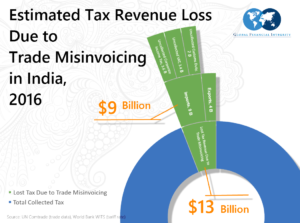
GFI: India Lost Approximately US$13.0 Billion to Trade Misinvoicing in 2016
June 5, 2019

By Ben Iorio
On June 3rd, Global Financial Integrity launched its comprehensive study regarding estimated revenue losses from trade misinvoicing in India during the year of 2016. In its report, GFI analyzed the level of trade misinvoicing in India and estimated potential tax revenue losses to the Indian government totaling US$13.0 billion, or the equivalent of 5.5 percent of the value of India’s total government revenue collection that year. GFI also examined the key trading partner countries and imported products from which the highest amount of trade misinvoicing occurred and recommended policy solutions for India to reduce trade misinvoicing and increase total revenue.
What is Trade Misinvoicing?
Trade misinvoicing is the largest source of illicit financial flows (IFFs) and occurs when importers or exporters falsify prices for goods on invoices. By analyzing official national reports on trade submitted to the United Nations Comtrade database, GFI is able to identify trade reports that do not correspond between trading partners. By manipulating the price or quantity of a good or service on import or export invoices, actors partaking in trade misinvoicing can avoid value added tax (VAT), claim tax incentives, dodge capital controls, or launder the proceeds of illegal activities. The main result of trade misinvoicing is a loss to government of tax revenue, thus limiting the government’s spending for public health, education and other essential services.
GFI’s Methodology
In analyzing the import and export gaps found in the Comtrade database, GFI estimated a value gap of all misinvoiced imports and exports for India to be US$74 billion, or 12 percent of India’s total trade of US$617 billion in 2016. GFI then used data from India’s VAT tax rate in 2016 (14.5%), custom duties tariffs as reported by the World Bank’s WITS database in 2016 and India’s tax rates on corporate profits in 2016, in order to estimate a total potential revenue loss in India in 2016 of US$13.0 billion.
Of the total US$13.0 billion, approximately US$4.0 billion was due to export misinvoicing and approximately US$9.0 billion was due to import misinvoicing.
As the largest portion of the estimated tax revenue loss occurred with misinvoiced imports, GFI undertook an in-depth examination of the imports in 2016. It identified key imported goods and trading partners most at risk for trade misinvoicing. In 2016, the imports which were mostly likely to have been misinvoiced included edible fruits and nuts (US$149 million), sugars (US$78.8 million), cereals (US$77.8 million) and vehicles (US$63.2 million). The trade partners with whom the most trade misinvoicing most frequently occurred in 2016, both in terms of their percentage total imports, as well as their dollar values of estimated customs revenues are the USA (US$176.1 million), Australia (US$172.7 million), South Africa (US$99.4 million) and Ghana (US$98.0 million).
Global Financial Integrity’s Policy Recommendations to India
Domestically, India should:
- Increase of Penalties – In June 2015 India reduced the penalty in cases of customs duty fraud. GFI recommended that India increase these penalties as a way to strengthen the deterrent against violating India’s already existing trade misinvoicing legislation.
- Beneficial Ownership – In 2017 India introduced an amendment to the Customs Act of 1962 which added “beneficial owner” to the definitions of “importer” and “exporter.” GFI commended this change and encouraged India to go further by establishing public registries of beneficial ownership information on all legal entities.
- Increase Customs Resources – Strengthening regulatory enforcement, invoice audits, and reviews regarding trade and trade misinvoicing would help to reduce trade misinvoicing and increase revenue. One way to do this would be through adopting GFI’s online tool – GFTrade – which allows customs authorities to compare in real time the price listed on invoices with recent global trade prices over the previous 12 months and transactions most likely to involve trade misinvoicing and flag such transactions for further investigation.
Internationally, India should:
- Restrict IFFs – At the international level, GFI recommends India support policy solutions that place restrictions on IFFs. Including but not limited to policy initiatives that:
- Encourage public registries of beneficial ownership;
- Support the Financial Action Task Force’s (FATF) anti-money laundering recommendations;
- Require multinational companies to publicly disclose their revenues, profits, losses, sales, taxes paid, subsidiaries, and staff levels on a country by country basis;
- Encourage all governments to participate in the worldwide movement towards the automatic exchange of tax information as endorsed by the OECD and the G20.
- Support the Addis Tax Initiative – Lastly, GFI recommends that India sign on to supporting the international Addis Tax Initiative and to take steps to encourage all other governments to do so as a means of building coordination in curtailing IFFs.
Through strengthening enforcement of regulations, increasing penalties for violating legislation and establishing public registries of beneficial ownership, India can regain lost revenues after misinvoicing is discovered. At the international level, India can support policy initiatives that restrict IFFs and encourage increased tax coordination among countries. Domestic and international policies to curtail IFFs and trade misinvoicing will lead to greater tax revenues for India and increased domestic spending on development and public services.
Read the full report here.
Ben Iorio is a junior in Economics at the University of Michigan and a GFI Economics Intern for Summer 2019.

